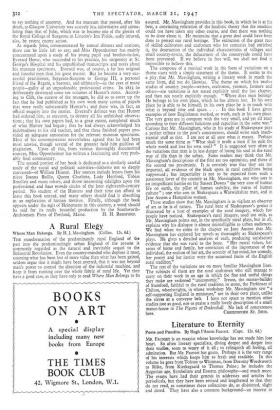A Rural Elegy-
Where Man Belongs. By H. J. Massingham. (Collins. 12s. 6d.)
THE transformation of the predominantly rural England of the past into the predominatingly urban England of the present is commonly regarded as the natural and inevitable sequel to the Industrial Revolution. Even the country-minded who deplore it most, counting what has been lost of more value than what has been gained, seldom argue that it might have been averted, that it was not beyond man's power to control the direction of the industrial machine, and keep it from running over the whole fabric of rural life. Yet they have a good case, as they have only to read Where Man Belongs to be
assured. Mr. Massingham provides in this book, in which he is at his best, a convincing refutation of the fatalistic theory that the machine could not have taken any other course, and that there was nothing to be done about it. He maintains that a great deal could have been done to protect our rural heritage. The extinction of the great race of skilled cultivators and craftsmen who for centuries had enriched it, the destruction of the individual characteristics of villages and small country-towns, the defacement of the countryside could have been prevented. If .we believe in free will, we shall not find it impossible to believe this.
The composer of a musical work in the form of variations on a theme starts with a simple statement of the theme. It seems to me a pity that Mr. Massingham, writing a literary work in much the same form, did not do likewise. The theme on which his twelve studies of country people—writers, craftsmen, yeomen, farmers and others—are variations is not stated explicitly until the last chapter, and then not nearly explicitly enough. " Where does man belong? He belongs to his own place, which he has almost lost. In his own place he is able to be himself, in his own place he is in touch with what is beyond time and space. . . . In this book I have given examples of how Englishmen worked, or work, each in his own place. The very great are in company with the very small, and yet all react according to their different functions and capacities in the same way." Curious that Mr. Massingham, who an his study of Shakespeare pays a perfect tribute to the poet's concreteness, should write such insub- stantial stuff as that. I am not at all sure what it means. Perhaps much the same thing as " What shall it profit a man if he gain the whole world and lose his own soul? " It is suggested very often in the variations that man is in less danger of losing his soul in the rural way of life than in the urban. Some readers may think that Mr. Massingham's descriptions of the first are too optimistic, and those of the second too pessimistic. It is certainly true that they are not impartial, all evidence of the black spots in rural conditions being suppressed ; but impartiality is not to be expected from such a passionate lover of the country as Mr. Massingham, one who sees in an insignificant hamlet on the Sussex Downs " the very core of human life on earth, the pillar of human stability, the nurse of human culture" ; one who sees in Shakespeare a Warwickshire man, and in Jane Austen a Hampshire woman. These studies show that Mr. Massingham is as vigilant an observer of art as he is of nature. The rural bent of Shakespeare's genius is illustrated by a host of examples of the rural imagery, which few people have noticed. Shakespeare's rural imagery, used not only, as Mr. Massingham points out, in the specifically rural plays, but in all, explains why his dialogue is almost unintelligible to urban audiences. We find when we come to the chapter on Jane Austen that Mr. Massingham has explored her novels as thoroughly as Shakespeare's plays. He gives a detailed analysis of each, producing satisfactory evidence that she was rural to the bone. " Her moral values, her sense of home and family, her conviction of the importance of the individual, the realism of her art, the serenity of her mind, her comedy, her poetry and her justice were the autumnal fruits of the English rural tradition."
The rest of the variations are on more familiar Massingham lines. The subjects of them are the rural craftsmen who still manage to carry on their work in an age in which the fine and useful things they make are reckoned " uneconomic." Ireson, the master-builder of Stamford, faithful to the rural tradition in stone, the Perkinses of Chilton, wheelwrights, in whose workshop Mr. Massingham saw " a self-supporting England in miniature," are in their own place, unlike the slaves at a conveyor belt. I have not space to mention other studies just as good, nor to. praise a really lovely description of a small manor-house in The Pigotts of Dodershall. No lack of concreteness•


































 Previous page
Previous page